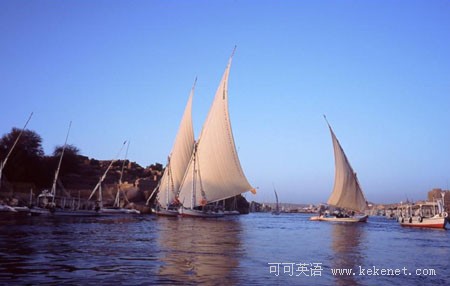
The longest river in the world, the Nile, flows through the north-western area of Africa, and then into the Mediterranean Sea.
Great civilizations have always flourished alongside rivers, but the Egyptian civilization, which started on the Nile, is the most fascinating and mysterious in the history of mankind.The Nile valley is a fertile one where there is an abundance of water and sun, elements which the ancient Egyptian believed were gods, they called the sun Amon and the Nile Apis.
Memphis was the first great capital of Egypt, united as a single kingdom in the third millennium B.C..But the Nile burst its banks a few centuries ago, flooding the ancient capital.
The river however has given more than it has taken, enough to make Herodotus, the ancient Greek historian say: Egypt is a gift from the Nile.
The annual floods left precious silt on the fields, a miraculous natural fertilizer which made the crops grow luxuriantly.
This instrument, called a Nilometer was used by the ancient Pharaohs to establish how high the periodic floods would be. The Nilometer, on the presupposition that the harvest would be plentiful, was nothing other than a device for setting income tax level.
世界上最長的河流尼羅河,流經非洲西北部,最終匯入地中海。
偉大的人類文明多發源于河流兩岸,但人類歷史上最為絢麗、神秘的是使于尼羅河的古埃及文明。尼羅河谷擁有充足的淡水與陽光,這二者被古埃及人奉為神靈,他們尊稱太陽為AMON,稱尼羅河為APIS。
孟菲斯是埃及第一個首都,公元前3000年,它建立為獨立王國。而若干世紀以前,尼羅河水泛濫,沖垮了古都。
但畢竟,尼羅河所賦予的遠大于它索取的。正如古希臘歷史學家希羅多德所言:埃及是尼羅河賜予的禮物。
每年洪水過后,土地上都會留下一層淤泥,這是能讓莊稼茁壯成長的天然優良肥料。
這個被稱作"Nilometer"的設備,是古代法老用來預測一定時期內洪水的可能高度。用于推斷豐收與否的"Nilometer",其實就是制定稅收標準的裝置。











